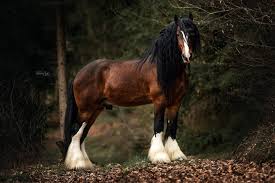
Shire
Conditions of detention
Shire horses require a stable or barn that provides ample space and shelter from weather extremes. Due to their large size, the stable should be well-ventilated, clean, and spacious enough to allow freedom of movement. Access to pasture or paddock space for regular exercise and grazing is essential for their well-being.
Useful Fact: Shires are social animals that thrive on interaction and companionship. Providing regular turnout and opportunities for socializing with other horses is important for their mental health.
Nutrition and diet
A balanced diet for Shire horses includes high-quality hay, fresh pasture, and a specially formulated commercial feed to meet their energy and nutritional needs. Due to their size, they have significant dietary requirements and may need additional supplements to maintain health.
Useful Fact: Shires have slower metabolisms compared to lighter horse breeds, so their diet needs to be carefully managed to prevent obesity while ensuring they receive adequate nutrition.
Health
Shire horses are generally healthy and robust but can be prone to certain health issues such as obesity, laminitis, and joint problems due to their size. Regular veterinary care, vaccinations, dental check-ups, and farrier visits are essential to maintaining their health.
Useful Fact: Regular exercise and proper diet management are key to preventing health issues related to weight and metabolism in Shire horses.
Grooming and care
Regular grooming is essential for keeping a Shire’s coat and skin healthy. Due to their thick feathering on the lower legs, special attention is needed to prevent skin infections. Daily brushing removes dirt and debris, stimulates circulation, and strengthens the bond between horse and handler.
Useful Fact: Shires require special care for their feathered legs to prevent skin conditions such as mud fever, which can be common in draft breeds with feathering.
Education and training
Shire horses are known for their gentle nature and willingness to work, making them highly trainable for both riding and driving. They excel in various activities, including plowing, pulling carriages, and participating in parades and shows.
Useful Fact: Despite their size, Shires are often referred to as “gentle giants” because of their calm temperament and easygoing nature, making them suitable for novice handlers with proper guidance.
Toys and entertainment
While horses do not play with toys like pets, providing enrichment activities such as varied terrain, obstacles, and ground poles can keep Shires mentally stimulated. Access to pasture and interaction with other horses also provides entertainment and enrichment.
Useful Fact: Shires enjoy having an environment that allows them to explore and engage with their surroundings. Regular turnout in a varied environment encourages natural behaviors and prevents boredom.
Safety
Ensure that the living environment is free from hazards such as sharp objects, loose wires, and toxic plants. Fencing should be secure and regularly inspected to prevent injuries and escapes.
Useful Fact: Shires are strong and powerful horses, so ensuring their environment is safe and secure is crucial for preventing accidents.
Accessories
Essential accessories for Shire horses include well-fitted tack, grooming supplies, and stable equipment. A properly fitted harness and collar are crucial for their comfort and performance when working or pulling.
Useful Fact: Investing in high-quality, well-fitted tack is essential for preventing injuries and discomfort during training and work.
Socialization
Shire horses are social animals that benefit from companionship with other horses. They often form strong bonds with their herd mates and enjoy social interactions in the pasture or stable.
Useful Fact: Providing opportunities for social interaction helps reduce stress and promotes a positive mental state for Shires.
Travel and Transportation
When transporting Shire horses, use a secure and well-ventilated horse trailer that accommodates their size. Ensuring that the trailer is spacious enough for comfort and safety during travel is important.
Useful Fact: Acclimating Shires to the trailer before long journeys helps reduce stress and ensures a smooth transportation experience.
Behavior and psychology
Shire horses are known for their intelligence, calmness, and willingness to work. They require consistent handling and training to build trust and a strong bond with their handler.
Useful Fact: Understanding a Shire’s body language and behavior helps anticipate their needs and fosters a positive relationship between horse and rider.
Legal aspects
Owning a Shire horse involves legal responsibilities such as registration, health documentation, and compliance with local equine regulations. It is important to stay informed about any legal requirements related to horse ownership and management.
Useful Fact: Registering a Shire with the appropriate breed association ensures access to breed-specific resources and support.


